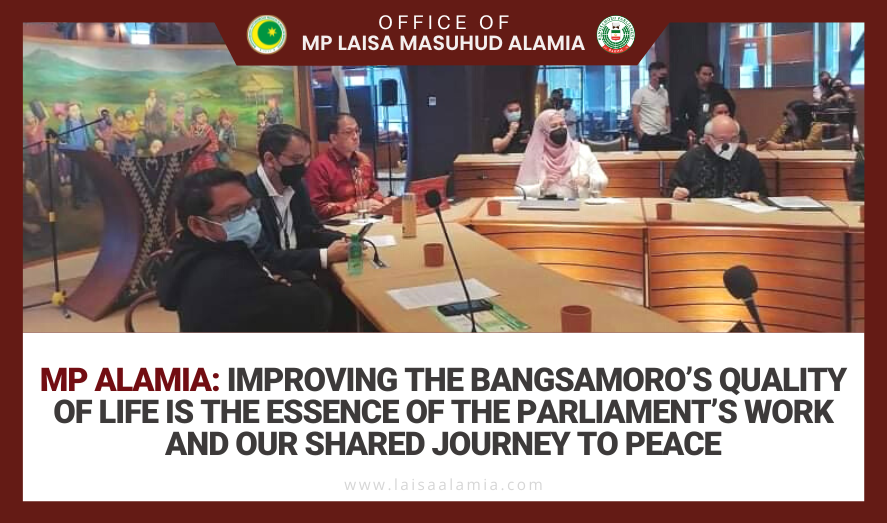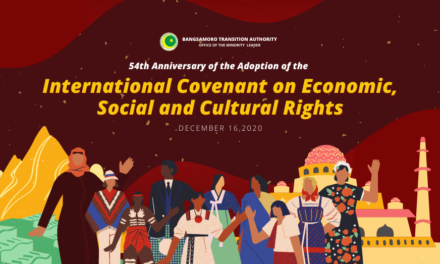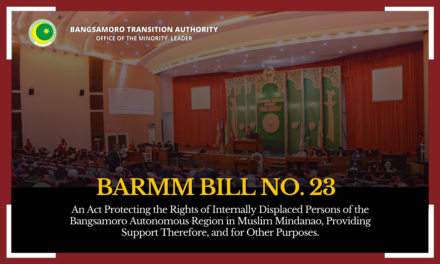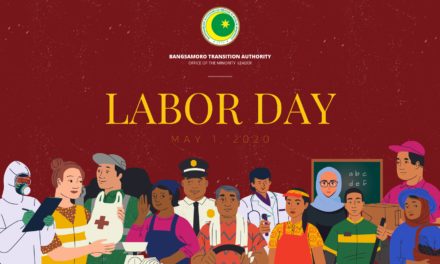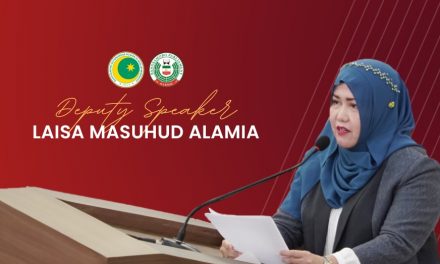Bangsamoro Transition Authority (BTA) Parliament Member Laisa Masuhud Alamia joins Datu Mussolini Sinsuat Lidasan, Al Qalam Insititute’s Executive Director, and Sec. Carlito Galvez Jr., Presidential Adviser on Peace, Reconciliation, and Unity for a panel discussion on recent developments in the Bangsamoro Autonomous Region in Muslim Mindanao (BARMM), following the appointment of a new set of members of the BTA Parliament.
The panel was held in the Ateneo de Davao University (ADDU) yesterday, September 21, and is the first in a series of conversations lined up for ADDU FOCUS: Forging Onwards as a Catholic University in Service, organized by the Al Qalam Institute and the ADDU University Community Engagement and Advocacy Council, in partnership with Samahan ng mga Mag-aaral ng Agham Pampulitika ng Ateneo (SAMAPULA).
The conversation series highlights ADDU’s mission of “championing the Mindanao agenda” as it celebrates its 75th anniversary.
No majority-minority divide in One BTA
During her presentation, MP Alamia gave an overview of the GPH-MILF peace process, highlighting recent developments such as the extension of the transition period for the Bangsamoro Regional Government reconstitution of the Bangsamoro Parliament.
Nearly a month after their appointment, the new set of parliament members had its inaugural session on September 15. Present during the session was the president, along with the leaders of the Moro Islamic Liberation Front and the Moro National Liberation Front.
“That day was historic,” said MP Alamia, “because for the first time following 46 years of separation, the presence of key figures of the MILF and MNLF came together.”
“That day brought so much light and hope to the Bangsamoro’s journey to peace,” she said.
During the session, the parliament also elected its next set of leaders, with a significant shift in the parliament’s legislative approach.
“We don’t have a majority-minority bloc anymore, this is One BTA,” MP Alamia noted. “I used to be the minority floor leader with seven of us in the minority bloc, but the parliament has decided and agreed on having only One BTA where we are united and committed in making sure that the directives given by the president and the provisions of the Bangsamoro Organic Law, along with the framework agreement and comprehensive agreement, will be implemented.”
From one parliament to the next
“We were able to pass 31 Bangsamoro Autonomy Acts, having filed 209 bills,” MP Alamia said, “with three priority codes passed.” The priority codes were the Bangsamoro Administrative Code, the Bangsamoro Education Code, and the Bangsamoro Civil Service Code.
Sharing updates from the current parliament, MP Alamia said that “last Monday, the government of the day filed the bills we are required by the end of the year or, at least, by the first quarter of 2023.” These bills include the Bangsamoro Local Government Code, the Bangsamoro Electoral Code, the Indigenous Peoples Code, and the Bangsamoro Revenue Code.
MP Alamia, on her end, has filed her versions of the Bangsamoro Electoral Code and a bill that will break up the Bangsamoro region into parliamentary districts, “but we know that the government of the day is also filing its own version. Later on, we will discuss all of this and will be consolidated, and this is a good way to start.”
The Bangsamoro Parliament is also preparing to hold more session days, with plans to hold sessions over the span of three weeks every month – the second, third, and fourth week – on Tuesdays, Wednesdays, and Thursday.
MP Alamia also noted that “great strides have been achieved over the past three years.” Among them is the significant decrease in poverty incidence in the region – from 55.6% in 2018 to 39.4% in 2021 – and the marked increase in investments coming into the Bangsamoro and in the allocations for social services in the region.
Core advocacies, then and now
“As members of parliament, It is part of our responsibility to fiscalize and do inquiries and monitor how the budget and resources are being utilized,” MP Alamia said, “and we will continue to do this while helping the government of the day in enhancing all of the codes they have drafted.”
Her primary target, however, is to give voice to the sectors she represents and supports, making sure that “the Bangsamoro peoples’ interests and needs will be represented in the discussions.”
For MP Alamia, this includes securing gender-responsive provisions in the Bangsamoro Electoral Code, because this is something that she has been “anticipating” given that this is the first time that the region will have its own electoral code. Noting the relatively low number of women in the Bangsamoro Parliament, especially among its leadership, she hopes to “ensure that women have equal access to democratic spaces and opportunities in the region.”
She will also re-file the Bangsamoro Parliamentary Women’s Caucus Bill, which is a proposal to create a caucus in the Bangsamoro Parliament as a venue for women leaders to unite and consolidate representation, crossing political divides in order to develop and sharpen an agenda, and build and mobilize political consensus to achieve meaningful progress for women’s issues, gender equality, and gender development
In the Local Governance Code, MP Alamia intends to “lobby for provisions that will empower BARMM local government units through meaningful devolution and fiscal autonomy.” Citing her years experience in working within the regional government prior to the establishment of the BARMM, she pointed out “a structural gap” in the previous autonomous region and in the current regional government with respect to the “meaningful devolution and decentralization of powers from the regional government to the local government units (LGUs).” She also emphasized the need to support the fiscal autonomy of LGUs, following the eventual implementation of the Mandanas Ruling.
Transitional justice and reconciliation key to peace and development
Among the core advocacies that MP Alamia has championed in the previous parliament, transitional justice and reconciliation (TJR) is one that she intends to strongly push for in the new parliament. She has started work on integrating TJR mechanisms or initiatives into the priority codes, whenever possible, to contribute in the Bangsamoro’s collective healing and reconciliation.
“If you look at all of the priority codes and all of the other codes we intend to pass, those can be encompassed under the umbrella of transitional justice and reconciliation,” MP Alamia said. “This is the only way we can move on and move forward towards genuine peace and development.”
During the panel, MP Alamia discussed the TJ legislative package that she has filed in the previous parliament, which she describes as “an earnest effort to fulfill both the duty set by law, and the Parliament’s mandate as the region’s stewards in enacting transitional justice and reconciliation mechanisms in the BARMM.”
The said package includes bills that directly deals with the protection of the rights of internally displaced persons, the documentation of HRVS in Bangsamoro armed conflict, the provision of a Bangsamoro Mujahideen/Mujahidat Benefits System and a Bangsamoro Health Care Subsidy Program, ensuring social and economic reparation and benefit initiatives for orphans of war, and the establishment of a Regional TJR Commission for the Bangsamoro.
“As stakeholders, we can all influence the direction and design of the priority codes and other regional policies,” MP Alamia reminded those who were present in the panel discussion. “You can get involved when we conduct our consultations. I would advise and encourage everyone, especially those in civil society and the academe, to get involved. Reach out to us; you can send position papers and petitions to the MPs in the BARMM. Monitor us, hold us accountable, and keep track of the Bangsamoro Parliament.”
“The transition period is still ongoing, the process is still very long. It will not end in 2025; it will continue even after the elections. The journey will be difficult, but our loyalty to our peace project will remain. At the core of what we are doing for the political transition is our primary goal of improving the Bangsamoro’s quality of life, and this is the essence of our project. It’s a project that all of us are involved in,” she said.
“This is our journey to peace, and I encourage you to continue the journey with us,” MP Alamia emphasized in her appeal to the audience. “Make use of the democratic spaces that are available to you,” MP Alamia stressed, “to join the conversations and to be part of solutions and to hold the government accountable.”

